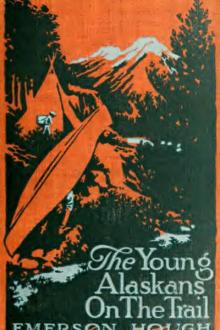The Young Alaskans by Emerson Hough (love books to read txt) 📕

- Author: Emerson Hough
- Performer: -
Book online «The Young Alaskans by Emerson Hough (love books to read txt) 📕». Author Emerson Hough
Sure enough, when at last the heavy boom of the Yucatan's warning whistle caused the window glass along the main street to tremble, a little party once more wended its way down the sidewalk toward the wharf. Uncle Dick led the way, earnestly talking with three very grave and anxious mothers. Behind him, perfectly happy, and shouting excitedly to one another, came Rob, Jesse, and John. Each carried a rifle in its case, and each looked excitedly now and then at the wagon which was carrying their bundles of luggage to the wharf.
"All aboard!" called the mate at the head of the gang-plank, laying hold of the side lines and waiting to pull it in. Again came the heavy whistle of the ocean steamer. The little group now broke apart; and in a moment the boys, somewhat sobered now, were waving their farewells to the mothers, who stood, anxious and tearful, on the dock.
"Cast off, there!" came the hoarse





Comments (0)